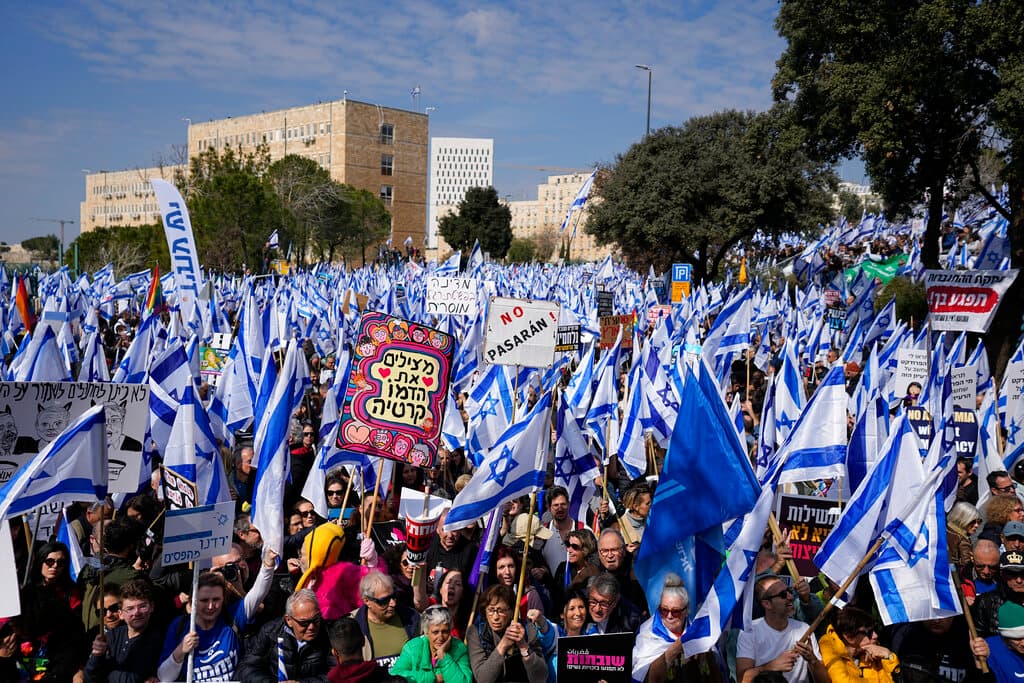It’s Biden v. Bibi
For Israelis a strange sight comes into focus — a foreign leader interfering in domestic politics, and a ceremonial figurehead pressing policy.

President Biden and Israel’s president, Isaac “Bougie” Herzog, appear to be on the same page. What unites them is opposition to Prime Minister Netanyahu’s proposed judicial reforms, setting the stage for a two-front resistance to the premier from both the White House at Washington and Beit HaNassi at Jerusalem. For Israelis a strange sight comes into focus — a foreign leader interfering in domestic politics, and a ceremonial figurehead pressing policy.
It is almost enough to cause us to forget that unlike Messrs. Biden and Herzog, Israelis voted to return Mr. Netanyahu to power as leader of a coalition that leans rightward. His judicial plan, which would give the elected Knesset greater say over how Supreme Court judges are chosen and the ability to “override” final judgements as well as shrink the court’s power of review, was a plank of his platform. That plan passed a parliamentary reading on Monday.
Cue the New York Times’s Thomas Friedman, who is using his Sunday column to convey what he calls a “clear message” from Mr. Biden. It is, after a brief paean to checks and balances, a chiding to the effect that “building consensus for fundamental changes is really important,” which sounds to our ears like a swipe at Mr. Netanyahu’s ability to govern.* Mr. Friedman is no stranger to moonlighting as a diplomat as well as a newspaperman.
Even the treble Pulitzer winner appeared taken aback, noting that it was for him the “first time I can recall a U.S. president has ever weighed in on an internal Israeli debate about the very character of the country’s democracy.” These comments remind us of President Obama’s threat, in the days before Brexit passed, that Britain would be “in the back of the queue” for a trade deal in the event they voted to divorce Brussels. In both instances, the threat is hardly veiled.
It appears that the Biden Administration has an ally in Mr. Herzog, Zionist royalty whose father, Chaim, also served as president, whose grandfather was chief rabbi, and whose uncle was Abba Ebban. In a speech Sunday, he warned the country is on the verge of “societal and constitutional collapse” and that the “powder keg is about to explode, and brothers are about to raise their hands against brothers.” Can a January 6 type protest be far behind?
Mr. Herzog proposed his own compromise plan to blunt the “potential negative impact on the democratic foundations of the State of Israel” and “halt the demon dance” of internecine conflict. Israel has no written constitution, but Mr. Herzog proposes a sub-constitutional law that would clarify the patchwork of measures that Israel calls its “Basic Laws.” The former prime minister, Yair Lapid, supports this scheme.
Mr. Lapid, though, was sent packing by the voters. Mr. Netanyahu’s allies have budged a bit, indicating that they would give some breathing room to Mr. Herzog’s proposals. Mr. Lapid vows that the “fight will not stop, the protest will not stop,” suggesting a desire to leverage some street demonstrations** to keep the heat up on the prime minister, who is under indictment for corruption, fraud, and breach of public trust.
One could argue that makes him either a compromised apostle of judicial reform or a leader who has grasped the danger of politicizing the courts. Either way, Israel’s voters have spoken. What gets us is that so many Democrats arguing against efforts to curb the Supreme Court in Israel are arguing for curbing the powers of the Supreme Court here at home. Maybe our Democrats dislike the choices of Israel’s voters as much as they dislike our Constitution.
________
* How’s Mr. Biden doing at consensus building on Capitol Hill?
** 0.54 percent of Israel’s population came out for the latest protest.

